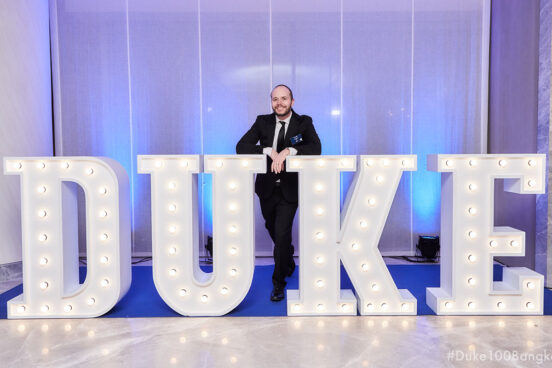Duke Global Executive MBA Student Blog

How ADHD Shapes the Way I Study, Work and Collaborate
Odds are, you or somebody you work with has ADHD, and a lack of understanding has probably led to lots of tension over the years. At least that’s been my experience.

It’s finals week, and my 15-minute study break has turned into a 3-hour side-quest of categorizing old photos I found on a thumb drive. My exam is tomorrow, and no matter what I do, these photos consume my thoughts to the point that I can’t focus on anything else. This didn’t happen because I’m lazy or unmotivated — I’ve been diligently studying for weeks. It’s not because my exams aren’t important either; I’ve been hugging the curve all term and need to do well. It’s just the way my ADHD (attention-deficit/hyperactivity disorder) brain works.
Odds are, you or somebody you work with has ADHD, and a lack of understanding has probably led to lots of tension over the years. At least that’s been my experience. On more than one occasion, teammates and I have spoken in circles for hours, giving each other looks like, “It’s so obvious, why aren’t you getting it?” Come to find out, we were arguing about the same thing, but from different perspectives (which, honestly, happens a lot in teams).
Understanding ADHD
I was fortunate enough to be diagnosed early in life, but it wasn’t until my 30s that I began to research my diagnosis and better understand its implications for myself and those around me. As I’ve come to understand myself better, I want to help others with neurodivergent minds find comfort in knowing they’re not alone and help those with neurotypical minds understand and unlock the talents of their peers. I should preface this blog by saying that this is my experience and may differ from the experience of others.
It’s important to understand that ADHD is biological, not behavioral. ADHD brains are literally built differently than our neurotypical peers, and what works for a neurotypical brain won’t work for an ADHD brain. Imagine Olympic swimmer Michael Phelps telling NBA superstar Steph Curry how to improve his jump shot — two elite athletes in two completely different sports. Not understanding the nuances of someone else’s world can leave everyone frustrated — that’s what happens when you don’t understand your ADHD peers.
ADHD and Teamwork
Here are four key factors that set ADHD brains apart, and tips to help your team be more successful.
1. Dopamine
In layman’s terms, dopamine is the “feel-good” chemical in your brain that gives you a boost when you’re doing something you enjoy; it’s associated with motivation. ADHD brains produce the same levels of dopamine as neurotypical brains, but we have a reduced number of dopamine receptors. This means our brains are typically under-stimulated because our “feel-good” hits are fewer and farther between. We’re not motivated by what’s important; we need something to be urgent, novel, challenging, or of personal interest to hold our attention.
How does this affect your team? Don’t expect ADHD brains to be motivated by the same things as neurotypical brains. Build deadlines and milestones into the planning process to create a sense of urgency, then hold each other accountable. For example, if a team assignment is due on a Saturday, instruct your team to complete their portions by Thursday and hold each other accountable. For ADHD brains, knowing they’ll be held accountable creates a sense of urgency (which helps with dopamine), and from a broader perspective, it allows a buffer for last-minute edits and revisions.
When your ADHD peers do something well, tell them! That little boost of dopamine goes a long way.
2. Hyper-Focus
I’ve learned a lot about how my brain works from Dr. Ned Hallowell. He tells his patients, “You’ve got a Ferrari engine for a brain, but bicycle brakes!” For those of us with ADHD, there’s no better metaphor.
Our mental default is deep thought, but we struggle to control what we’re thinking about. Our focus is interest-based, and once something grabs our attention and gets us excited (dopamine), we experience something neurotypical brains can’t comprehend called hyper-focus.
Hyper-focus is intense. In my experience, I become wholly consumed by one thing, and everything else fades into the distance. Sometimes, I can’t sleep, forget to eat, and before I know it, I’ve spent hours exclusively focused on that one thing. ADHD brains can’t just flip a switch to turn on hyper-focus; it must happen organically. Here are some tricks I’ve found useful to boost brain function:
- Create an environment that limits distraction. I have a room in my house specifically for work and study. It’s quiet, with plenty of table space and whiteboards listing my tasks. When competing tasks come to mind, I jot them down and revisit them later.
- Give yourself the stimulus you need. If what I’m working on isn’t stimulating enough, I introduce supplemental stimulants. Sometimes I burn incense, play instrumental music, or wear my softest hoodie. Engaging different senses helps without interfering with my focus.
In teams, understand that hyper-focus can lead to highs and lows. ADHD brains are sensitive, and when we feel embarrassed, frustrated, or rejected, that can lead to hyper-focusing on those feelings. Accountability is important, but so is affirming our value to the team. Keep feedback constructive and encouraging.
3. Executive Function
Executive function deals with how you plan and execute tasks over time. With ADHD, executive function can be delayed by up to 30%. A neurotypical thought process might look like: A, B, C, D. For me and others with ADHD, it might look more like: A, B, L, M, N, O, P, X, Y, C, D. We eventually get to D, but we take the scenic route. Along the way, we make connections others haven’t thought of, anticipate setbacks, and spot overlooked details — a vital skill for any team.
In your teams, remember that ADHD brains might find it easier to see problems from 360 degrees. Sometimes we struggle to explain our thinking clearly, but that’s where communication comes in. Ask ADHD teammates to walk you through their thought process, and you might be surprised by the insights.
4. Time Blindness
Time blindness is the inability to recognize how much time has passed and to estimate how long tasks will take. People with ADHD may experience a soft sense of time and have shorter time horizons. Things don’t feel “real” until they’re happening. That’s why creating deadlines before the actual due date is so important. Time blindness also affects punctuality: it’s not that we don’t care, we just lose track of time.

Turning Awareness Into Action
Remember that 15-minute study break turned 3-hour side-quest? Here’s how all four factors (dopamine, hyper-focus, executive function, and time blindness) created a perfect storm in my life:
- The content was no longer stimulating.
- The photos gave me a dopamine boost.
- I hyper-focused on organizing them.
- My time blindness made me unaware of how much time passed.
When dopamine hits and hyper-focus kicks in, executive function follows, and time blindness compounds. Once I realized what had happened, I stepped away for a few minutes to shift gears. When I came back, I put the thumb drive away, lit some incense, and got back to work.
If you’re one of the lucky ones with ADHD and kept focused long enough to read this far, congratulations! Enjoy the dopamine boost! If you’re neurotypical, I hope our ADHD brains make a little more sense now.



